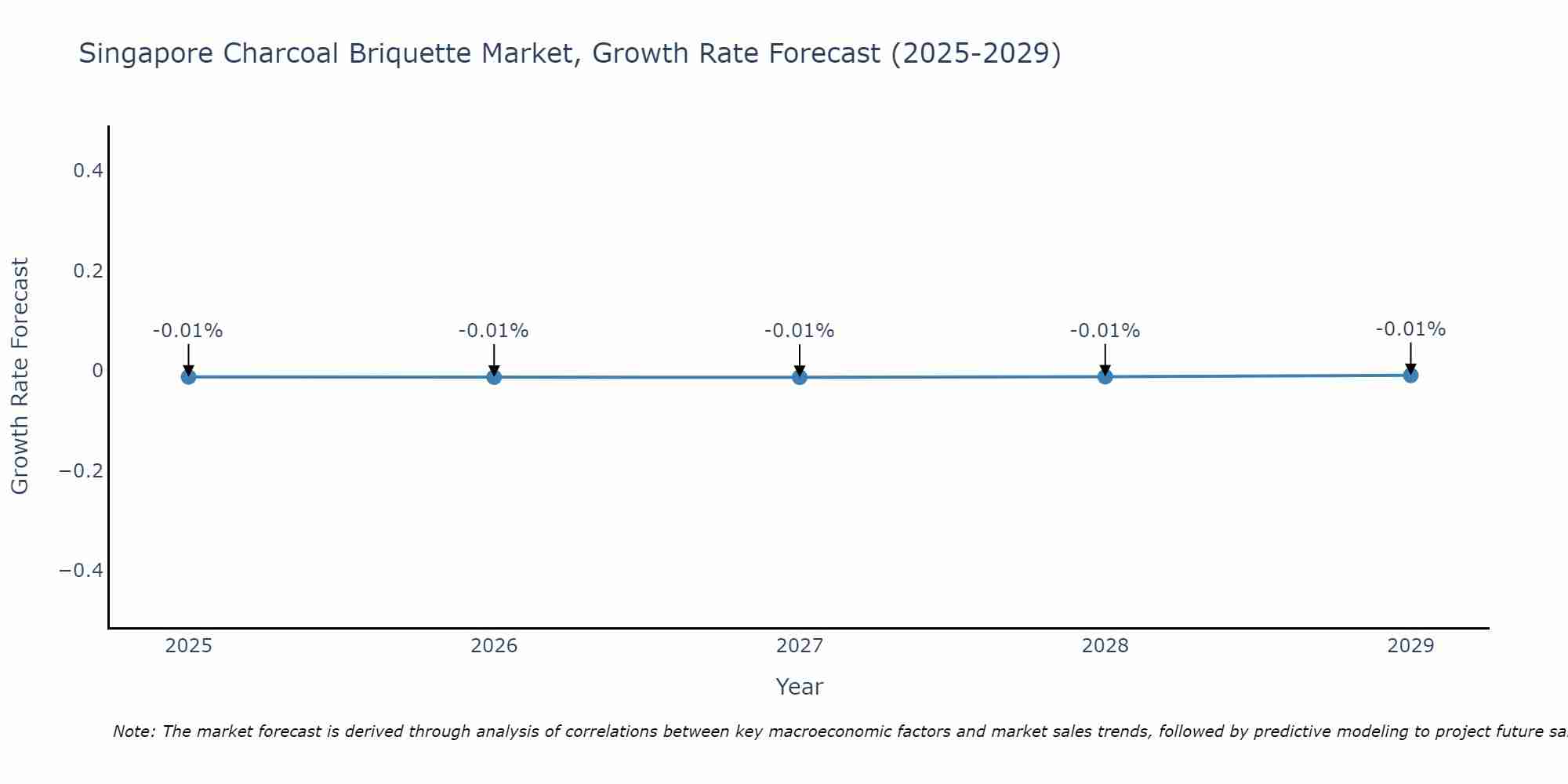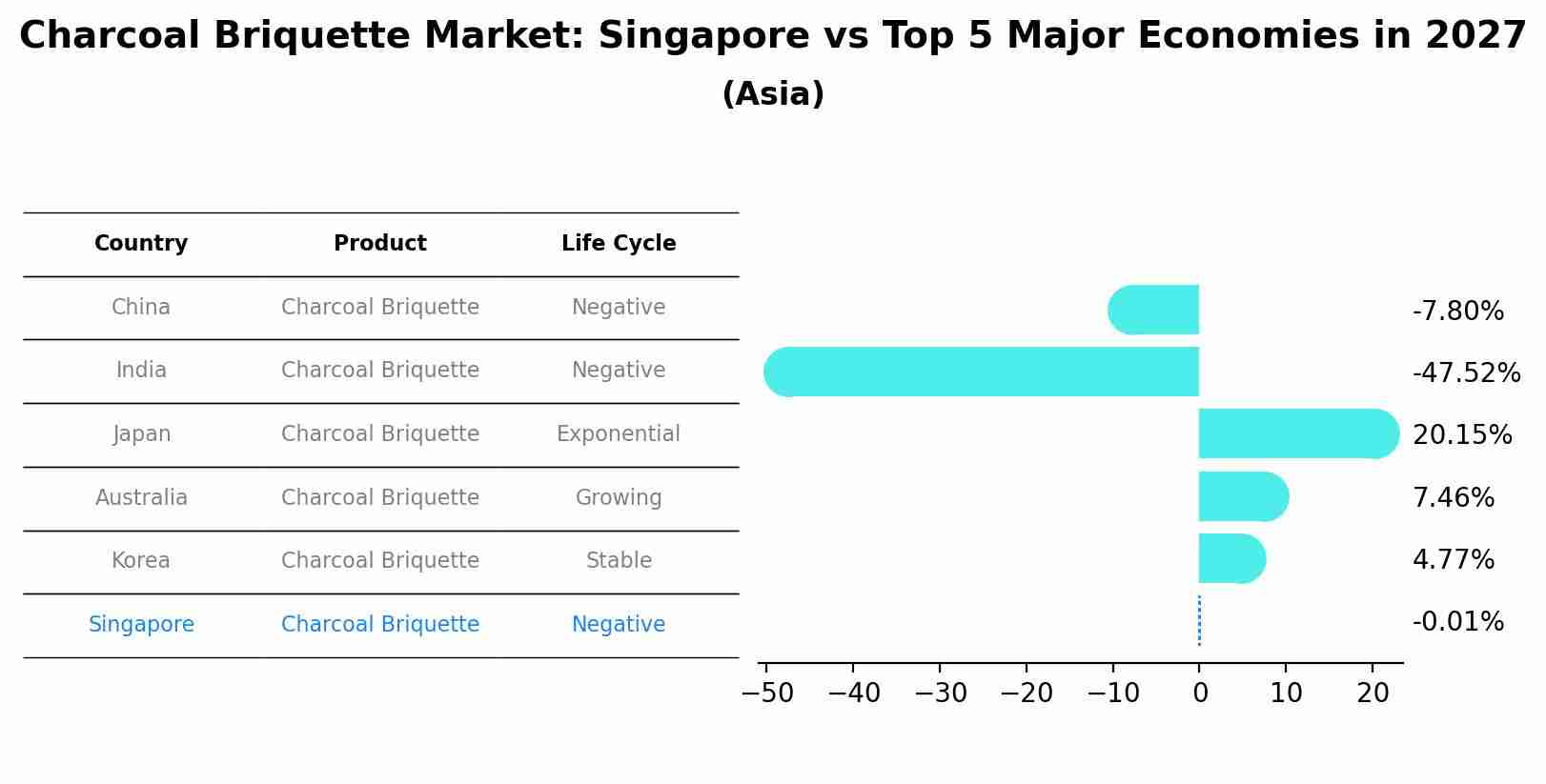Singapore Charcoal Briquette Market (2025-2031) Outlook | Companies, Value, Size, Industry, Revenue, Share, Growth, Forecast, Trends & Analysis
| Product Code: ETC286527 | Publication Date: Aug 2022 | Updated Date: Apr 2025 | Product Type: Market Research Report | |
| Publisher: 6Wresearch | Author: Ravi Bhandari | No. of Pages: 75 | No. of Figures: 35 | No. of Tables: 20 |
Singapore Charcoal Briquette Market Size Growth Rate
The Singapore Charcoal Briquette Market is projected to witness mixed growth rate patterns during 2025 to 2029. The growth rate starts at -0.01% in 2025 and reaches -0.01% by 2029.

Charcoal Briquette Market: Singapore vs Top 5 Major Economies in 2027 (Asia)
By 2027, Singapore's Charcoal Briquette market is forecasted to achieve a negative growth rate of -0.01%, with China leading the Asia region, followed by India, Japan, Australia and South Korea.

Singapore Charcoal Briquette Market Synopsis
The charcoal briquette market in Singapore is witnessing a shift towards sustainable and eco-friendly products due to growing environmental awareness. Charcoal briquettes, commonly used for grilling and cooking purposes, are facing increasing demand from both households and the foodservice industry. Consumers are now more inclined to opt for briquettes made from renewable sources, focusing on reducing carbon footprints. As a response, manufacturers are emphasizing product innovation and quality, utilizing waste biomass and adopting efficient production processes. The market`s future is likely to be characterized by a balance between tradition and innovation, with sustainability playing a pivotal role in shaping consumer preferences and industry practices.
Drivers of the Market
The Singapore charcoal briquette market is influenced by several factors. Firstly, the increasing awareness of environmental issues and a preference for sustainable energy sources have boosted the demand for charcoal briquettes as a cleaner alternative to traditional charcoal. Secondly, the popularity of outdoor cooking and barbecue activities has driven consumer interest in charcoal briquettes. Additionally, the hospitality industry in Singapore, including restaurants and hotels, relies on charcoal briquettes for grilling purposes, further fueling the market. Moreover, innovative packaging and marketing strategies are making charcoal briquettes more accessible to a wider audience.
Challenges of the Market
The Singapore charcoal briquette market encounters challenges related to sustainability and environmental concerns. Given the city-state`s limited forest resources, raw material sourcing can be a constraint. Furthermore, there`s a growing awareness of the environmental impact of charcoal production and consumption. Companies in this market must prioritize sustainable sourcing practices and invest in technologies that reduce emissions during the production process. Creating awareness among consumers about the benefits of eco-friendly charcoal briquettes can also be a challenge.
COVID-19 Impact on the Market
The Singapore charcoal briquette market faced mixed effects during the COVID-19 pandemic. On one hand, with more people staying at home and cooking, there was increased demand for charcoal briquettes for barbecues and outdoor grilling. However, the closure of restaurants and restrictions on gatherings led to decreased demand from the foodservice industry. Supply chain disruptions also affected the availability of raw materials for briquette production. As restrictions eased and outdoor activities resumed, the market started to recover, but it remained somewhat influenced by changing consumer behaviors.
Key Players in the Market
In the Singapore charcoal briquette market, companies like Kingsford and Weber are prominent players. They offer charcoal briquette products known for their quality and consistency. Their reputation for producing excellent grilling and barbecuing fuels has established them as leaders in this segment.
Key Highlights of the Report:
- Singapore Charcoal Briquette Market Outlook
- Market Size of Singapore Charcoal Briquette Market, 2024
- Forecast of Singapore Charcoal Briquette Market, 2031
- Historical Data and Forecast of Singapore Charcoal Briquette Revenues & Volume for the Period 2021-2031
- Singapore Charcoal Briquette Market Trend Evolution
- Singapore Charcoal Briquette Market Drivers and Challenges
- Singapore Charcoal Briquette Price Trends
- Singapore Charcoal Briquette Porter's Five Forces
- Singapore Charcoal Briquette Industry Life Cycle
- Historical Data and Forecast of Singapore Charcoal Briquette Market Revenues & Volume By Type for the Period 2021-2031
- Historical Data and Forecast of Singapore Charcoal Briquette Market Revenues & Volume By Wood Type for the Period 2021-2031
- Historical Data and Forecast of Singapore Charcoal Briquette Market Revenues & Volume By Others for the Period 2021-2031
- Historical Data and Forecast of Singapore Charcoal Briquette Market Revenues & Volume By Application for the Period 2021-2031
- Historical Data and Forecast of Singapore Charcoal Briquette Market Revenues & Volume By Metallurgical Industry for the Period 2021-2031
- Historical Data and Forecast of Singapore Charcoal Briquette Market Revenues & Volume By BBQ for the Period 2021-2031
- Historical Data and Forecast of Singapore Charcoal Briquette Market Revenues & Volume By Others for the Period 2021-2031
- Singapore Charcoal Briquette Import Export Trade Statistics
- Market Opportunity Assessment By Type
- Market Opportunity Assessment By Application
- Singapore Charcoal Briquette Top Companies Market Share
- Singapore Charcoal Briquette Competitive Benchmarking By Technical and Operational Parameters
- Singapore Charcoal Briquette Company Profiles
- Singapore Charcoal Briquette Key Strategic Recommendations
Frequently Asked Questions About the Market Study (FAQs):
- Single User License$ 1,995
- Department License$ 2,400
- Site License$ 3,120
- Global License$ 3,795
Search
Thought Leadership and Analyst Meet
Our Clients
Related Reports
- Canada Oil and Gas Market (2026-2032) | Share, Segmentation, Value, Industry, Trends, Forecast, Analysis, Size & Revenue, Growth, Competitive Landscape, Outlook, Companies
- Germany Breakfast Food Market (2026-2032) | Industry, Share, Growth, Size, Companies, Value, Analysis, Revenue, Trends, Forecast & Outlook
- Australia Briquette Market (2025-2031) | Growth, Size, Revenue, Forecast, Analysis, Trends, Value, Share, Industry & Companies
- Vietnam System Integrator Market (2025-2031) | Size, Companies, Analysis, Industry, Value, Forecast, Growth, Trends, Revenue & Share
- ASEAN and Thailand Brain Health Supplements Market (2025-2031) | Strategy, Consumer Insights, Analysis, Investment Trends, Opportunities, Growth, Size, Share, Industry, Revenue, Segments, Value, Segmentation, Supply, Forecast, Restraints, Outlook, Competition, Drivers, Trends, Demand, Pricing Analysis, Competitive, Strategic Insights, Companies, Challenges
- ASEAN Bearings Market (2025-2031) | Strategy, Consumer Insights, Analysis, Investment Trends, Opportunities, Growth, Size, Share, Industry, Revenue, Segments, Value, Segmentation, Supply, Forecast, Restraints, Outlook, Competition, Drivers, Trends, Demand, Pricing Analysis, Competitive, Strategic Insights, Companies, Challenges
- Europe Flooring Market (2025-2031) | Outlook, Share, Industry, Trends, Forecast, Companies, Revenue, Size, Analysis, Growth & Value
- Saudi Arabia Manlift Market (2025-2031) | Outlook, Size, Growth, Trends, Companies, Industry, Revenue, Value, Share, Forecast & Analysis
- Uganda Excavator, Crane, and Wheel Loaders Market (2025-2031) | Strategy, Consumer Insights, Analysis, Investment Trends, Opportunities, Growth, Size, Share, Industry, Revenue, Segments, Value, Segmentation, Supply, Forecast, Restraints, Outlook, Competition, Drivers, Trends, Demand, Pricing Analysis, Competitive, Strategic Insights, Companies, Challenges
- Rwanda Excavator, Crane, and Wheel Loaders Market (2025-2031) | Strategy, Consumer Insights, Analysis, Investment Trends, Opportunities, Growth, Size, Share, Industry, Revenue, Segments, Value, Segmentation, Supply, Forecast, Restraints, Outlook, Competition, Drivers, Trends, Demand, Pricing Analysis, Competitive, Strategic Insights, Companies, Challenges
Industry Events and Analyst Meet
Whitepaper
- Middle East & Africa Commercial Security Market Click here to view more.
- Middle East & Africa Fire Safety Systems & Equipment Market Click here to view more.
- GCC Drone Market Click here to view more.
- Middle East Lighting Fixture Market Click here to view more.
- GCC Physical & Perimeter Security Market Click here to view more.
6WResearch In News
- Doha a strategic location for EV manufacturing hub: IPA Qatar
- Demand for luxury TVs surging in the GCC, says Samsung
- Empowering Growth: The Thriving Journey of Bangladesh’s Cable Industry
- Demand for luxury TVs surging in the GCC, says Samsung
- Video call with a traditional healer? Once unthinkable, it’s now common in South Africa
- Intelligent Buildings To Smooth GCC’s Path To Net Zero


















